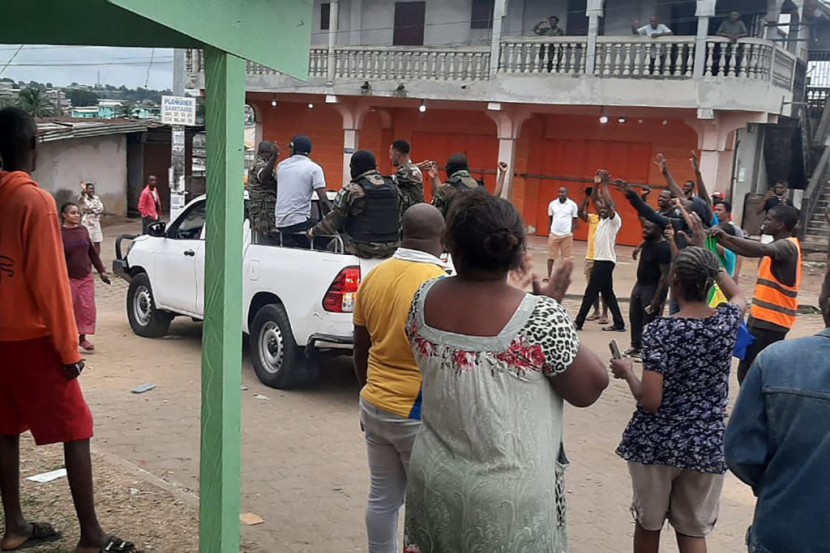
Military officers of the oil-rich African nation of Gabon seized power Wednesday (August 30) to put an end to the regime of 64-year-old President Ali Bongo Ondimba and his family.
The coup leaders, who called themselves the Committee of Transition and the Restoration of Institutions, appeared on national television announcing they had placed Bongo under house arrest and canceled the results of the country's August 26 election, which would have given him a third term in office.
Mutineers have also closed its borders and dissolved state institutions, such as the senate and parliament, the constitutional court, and the electoral commission, claiming they have the full support of Gabon's security and defense forces, as per Reuters.
The Committee added that Gabon was "undergoing a severe institutional, political, economic, and social crisis," which prompted them to act and nullify the election results.
In the hours prior to this report, Bongo called on the Gabonese people to "make noise" and protest the coup, the Associated Press reported. He also said he was in his residence but his wife and son were held elsewhere.
On the other hand, Gabonese coup leader, Presidential Guard commander Gen. Brice Oligui Nguema, told French newspaper Le Monde that Bongo would "enjoy all his rights" as a Gabonese citizen and head of state, but has neither confirmed nor denied whether he will declare himself the new president of the country.
Discontent Fueled by Oil Revenue
The latest coup attempt was the most successful act out of several against Bongo's regime.
Discontent against Bongo's rule had been growing as early as 2016 when violent unrest broke out upon his reelection as president for a second term. An earlier coup attempt was staged in 2019, months after the president suffered a stroke abroad, raising doubts about his ability to rule.
"We think the soldiers will want to hang onto power and set up a national dialogue of some sort to draw up a new constitution, while they rid the bureaucracy of (Bongo's) loyalists," Oxford Economics political economist François Conradie noted as the situation developed.
What exacerbated the situation was Gabon's oil production industry and how the revenue was being channeled. The country could produce about 200,000 barrels a day and is quickly depleting.
While Bongo's team and supporters rejected allegations of fraud in the latest general elections, the lack of international observers, the suspension of some foreign broadcasts, and the authorities' decision to cut internet service and impose a night-time curfew nationwide after the poll raised concerns about the transparency of vote.
Francophone Spring
Hundreds of people took to the streets of Gabon's capital, Libreville, shortly after the announcement to celebrate Bongo's downfall after over half a century of his family's rule. His father, Omar Bongo, ruled the country from 1967 to 2009.
Internet access was also restored for the first time since the vote.
Critics of the Bongo regime say the family has done little to share the state's oil and mining wealth with its 2.3 million people.
If successful, the coup would be the eighth in the West and Central African regions since 2020. The latest one prior to Gabon's was Niger back in July when President Mohamed Bazoum was deposed in a similar manner.
Military officers have also seized power in Mali, Guinea, Burkina Faso, and Chad, erasing democratic gains since the 1990s.
Meanwhile, London School of Economics senior visiting fellow Michaek Amoah told Al Jazeera people in former French colonies in Africa have had enough of leaders clinging to power, and called the multiple coups and revolutions in these nations a "Francophone Spring."
"If you look across the African continent at the moment, apart from Uganda and Equatorial Guinea, every single country where you find a presidential term extension, they are all Francophone," he added. "These heads of state can rule for a very long time. In Cameroon, for 41 years and counting."
Global Response
France, Gabon's former colonial ruler, was following the situation closely, according to French Prime Minister Elisabeth Borne. Because of the Gabonese coup, the nuclear-capable European country's African presence is further becoming uncertain because of the multiple coups from its former colonies, such as Mali, Burkina Faso, and Niger.
There are about 350 French military personnel in Gabon.
Meanwhile, China's foreign ministry called for the situation in Libreville to be resolved peacefully and said the personal safety of Bongo should be ensured. Bongo visited Beijing in April this year. Russia's foreign ministry also echoed Beijing's sentiments.
This is a developing story. Please follow HNGN for further updates.
Related Article: ECOWAS Announces 'D-Day': Set to Restore Niger to Democratic Rule
© 2025 HNGN, All rights reserved. Do not reproduce without permission.








